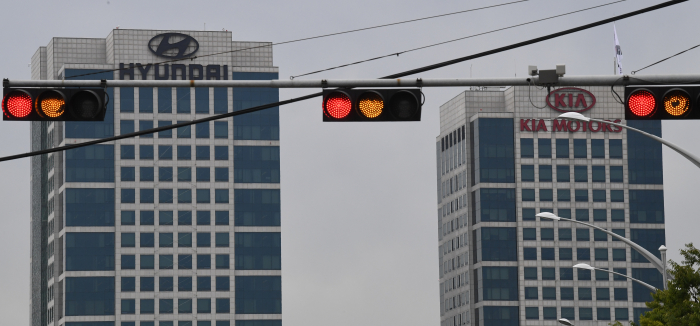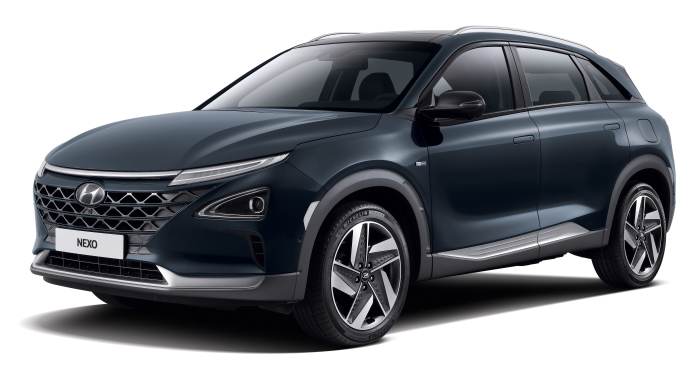Automakers
Hyundai, Kia set to change gear to revive China sales
By Mar 10, 2021 (Gmt+09:00)
3
Min read
Most Read
LG Chem to sell water filter business to Glenwood PE for $692 million


KT&G eyes overseas M&A after rejecting activist fund's offer


Kyobo Life poised to buy Japan’s SBI Group-owned savings bank


StockX in merger talks with Naver’s online reseller Kream


Meritz backs half of ex-manager’s $210 mn hedge fund



Hyundai Motor Co. and Kia Corp. posted their worst results in China last year since they advanced into that neighboring market in 2002. Their Chinese units logged a combined 1.8 trillion won ($1.6 billion) in operating losses in 2020, marking four consecutive years of declining shipments to China.
The two South Korean automakers under the Hyundai Motor Group are now gearing up to revive sales in China, with the rollouts of new, luxury models to catch up with changing consumer trends in the world's largest auto market, abandoning small and budget cars previously tailored to the market.
Dwindling sales in China are in contrast to their brisk shipments to Europe and the US. The poor results were blamed mainly on China's boycott of Korean products since South Korea deployed the Terminal High Altitude Area Defense (THAAD) anti-missile system in 2017. A lack of new and high-end models and weakened brand reputation, compared to their German and Japanese rivals, led to a doubling of their operating losses in the country in 2020, alongside the COVID-19 outbreak.
Beijing Hyundai, a joint venture between Hyundai Motor and BAIC Motor Investment Co., saw its 2020 sales nearly halved to 6.87 trillion won, according to Hyundai's Mar. 10 announcement.
Last year, shipments to China dropped by 27% year-on-year to a combined 664,744 units for both Hyundai and Kia, fewer than half their shipments of 1.79 million units in 2016. Their market share contracted to 3.4% from 10% in the early 2010s.
| 2020 | 2019 | |||
| Sales | Operating loss | Sales | Operating loss | |
| Beijing Hyundai | 6.87 trillion won | 1.15 trillion won | 10.21 trillion won | 523.4 billion won |
| Dongfeng Yueda Kia | 3.59 trillion won | 649.9 billion won | 3.76 trillion won | 312.0 billion won |
“Because of declining sales, they had to bump up incentives to dealers which, in turn, hit their earnings. It was a repeating cycle,” said an automobile industry source. "They were caught in the corner.”
Some pointed out that Hyundai and Kia failed to catch up with Chinese drivers’ shift towards sports utility vehicles and luxury cars, after enjoying steady sales of small and midsize sedans and cheap models tailored to the market.
Now the Korean automotive group appears to be caught between luxury German and Japanese brands and low-priced Chinese carmakers.
To narrow shortfalls, Beijing Hyundai and Dongfeng Yueda Kia shut down one of their plants each, replaced their heads, along with Hyundai Motor Group’s Chinese operations chief, and unveiled new models. But such attempts proved fruitless.
COMPLETE CHANGE
Now both Hyundai and Kia are determined to completely revamp their images and product lineups to become high-end brands, instead of budget automakers.
“We have to change our image even at the cost of falling sales,” said a senior Hyundai Motor official. “We will no more rush to sell cars by giving incentives to dealers, and will change our strategy to transform into a brand that consumers want first.”
This year, Hyundai will launch its hydrogen fuel cell electric vehicle Nexo, its latest EV model IONIQ 5 and the new version of its Tucson SUV in China, as well as its luxury sedan Genesis.

Kia will release the revamped version of the Carnival minivan in China this year. The sister company of Hyundai Motor on Mar. 9 showcased teaser images and video clips of EV6 – the first of seven all-electric vehicles the company plans to launch by 2026.
Hyundai and Kia are aiming to sell a combined 817,000 units in China this year -- 562,000 units by Hyundai and 255,000 units by Kia. That will represent a 23% jump from last year’s shipments.
Write to Byung-Uk Do and Il-Gue Kim at dodo@hankyung.com
Yeonhee Kim edited this article.
More to Read
-
 New EV modelKia reveals teaser of first dedicated EV model, EV6
New EV modelKia reveals teaser of first dedicated EV model, EV6Mar 09, 2021 (Gmt+09:00)
2 Min read -
 EV recallsHyundai, LG Energy agree to split EV recall costs, reflect in Q4 results
EV recallsHyundai, LG Energy agree to split EV recall costs, reflect in Q4 resultsMar 05, 2021 (Gmt+09:00)
2 Min read -
 Fuel cell vehiclesHyundai Motor to ramp up fuel cell car production
Fuel cell vehiclesHyundai Motor to ramp up fuel cell car productionMar 02, 2021 (Gmt+09:00)
2 Min read -

-
 CEO interviewKia aims to become purpose-built vehicle market leader: CEO
CEO interviewKia aims to become purpose-built vehicle market leader: CEOFeb 02, 2021 (Gmt+09:00)
4 Min read
Comment 0
LOG IN


